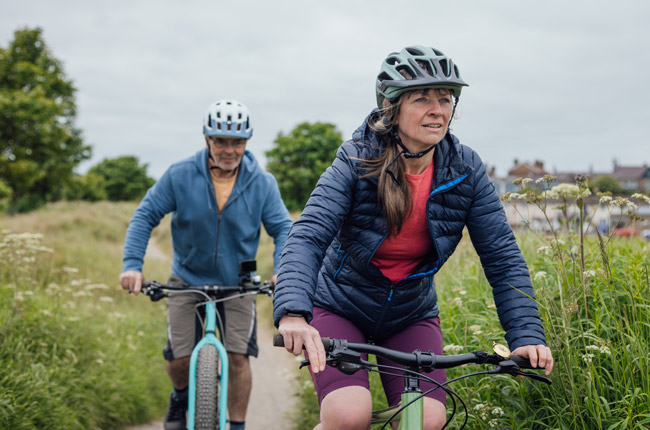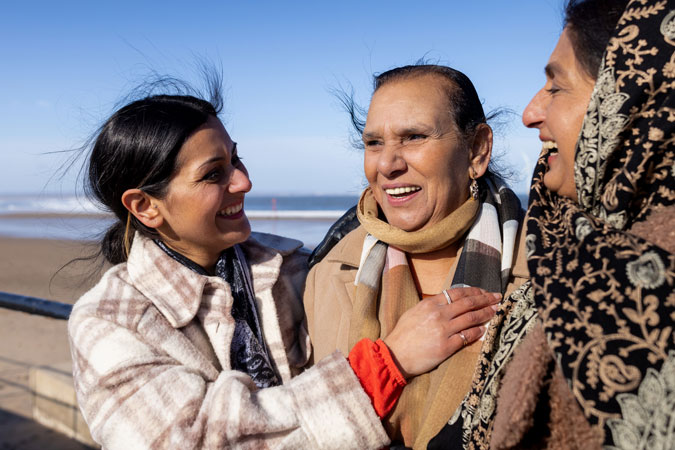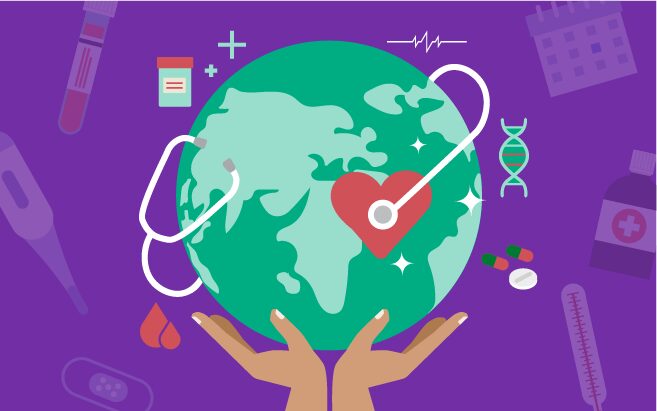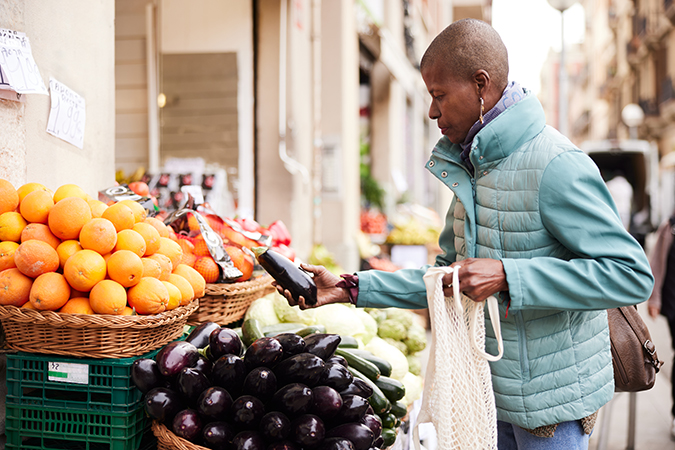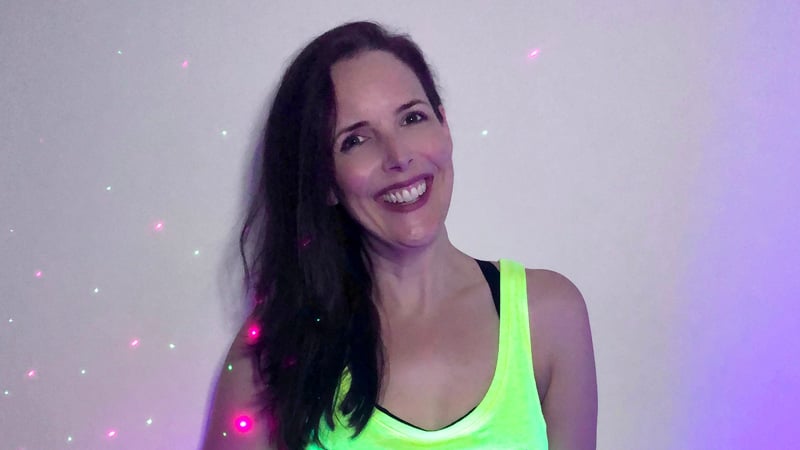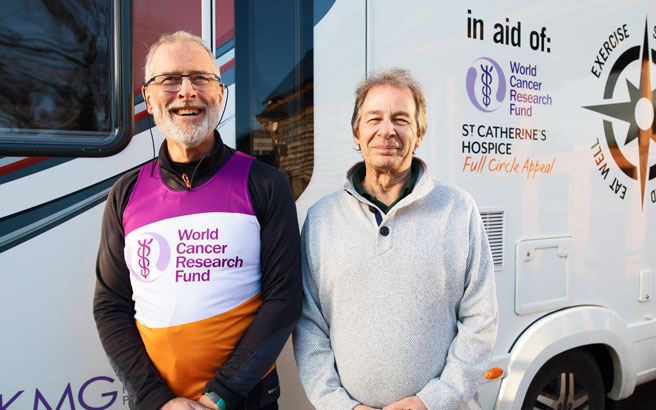Key takeaways:
- The CO21 CHALLENGE Trial found that a structured exercise programme after chemotherapy led to a 28% lower risk of cancer recurrence in colon cancer survivors compared with usual care.
- This is the first randomised controlled trial (RCT) to show that exercise directly improves survival in colon cancer patients. It confirms what observational studies have long suggested.
- The results were presented at a recent conference and made headline news. Experts say the CHALLENGE Trial marks a shift from viewing exercise as a “nice to have” to a “need to have” in cancer care.
Colon (part of the large bowel) cancer survivors who took part in a 3-year structured exercise programme had a 28% lower risk of cancer recurrence or a 2nd cancer. They also had a 37% lower risk of death compared with usual care.
These findings were shared at the 2025 Association of Clinical Oncology (ASCO) Annual Meeting. They were also published in the New England Journal of Medicine.
The ASCO Annual Meeting is the world’s largest oncology conference. It attracts more than 40,000 attendees from around the world. Every year, ASCO highlights the latest advancement in treatments. It also shares the directions that have the greatest potential for progress and patient impact.
Spotlight on exercise
The CO21 CHALLENGE Trial pulled back the curtain on a weapon that has been hiding in plain sight: physical activity. The results of the trial showed improvement in disease-free survival and overall survival in colon cancer survivors in the aerobic exercise intervention group. This trial is the first gold standard RCT to show what has long been indicated from observational studies. This is a big deal!
The impact of exercise on cancer outcomes has been a topic of great debate. Observational research has shown improvements in survival and quality of life linked to higher levels of physical activity. However, observational study designs are limited. They do not show cause and effect.
Plus, they are hard to implement in clinical settings due to concerns that the reported effects may not truly reflect the impact of exercise (and may be due to something else).
Our research
Over the past few years, World Cancer Research Fund International has done extensive reviews through its flagship Global Cancer Update Programme (CUP Global).
CUP Global includes partnerships with American Institute for Cancer Research, World Cancer Research Fund in the UK and Wereld Kanker Onderzoek Fonds in the Netherlands.
Our CUP Global reviews look at the extent to which diet, nutrition and physical activity impact people after a diagnosis of breast and colorectal cancers with regard to:
- cancer-specific mortality
- all-cause mortality
- risk of cancer recurrence
- health-related quality of life
An expert panel judged the strength of this CUP Global evidence. There were some limitations. Still, detailed recommendations were made to strengthen future research. One of the key recommendations was for well-conducted trials to look at the impact of nutrition or physical activity. The CHALLENGE trial is therefore very timely.
The CUP Global analysis was published in the International Journal of Cancer. It was cited several times in the CHALLENGE trial manuscript.
The CUP Global analysis compared highest with lowest levels of activity. We found that all-cause mortality was reduced by 23–40% depending on physical activity exposure.
Prof Anne May, University Medical Centre, Utrecht
During our review of the literature concerning the impact of post-diagnosis physical activity on colorectal cancer prognosis for the Global Cancer Update Programme (CUP Global), we were unable to draw strong conclusions due to lacking evidence from randomized controlled trials. The Challenge trial provides exactly the evidence we were waiting for.
The summary estimate for studies that assessed activity dose was measured in MET hours per week.
- A 10 MET hour per week increase in activity was linked to a 24% reduction in all-cause mortality.
- A change of 10 MET hours per week was also the intervention goal in the CHALLENGE trial.
The effect sizes in this first, gold-standard RCT are remarkably well-aligned with the CUP Global analyses of observational studies.
During the presentation of the trial results at ASCO, the authors shared this chart. It includes the treatment benefits from approved therapies for colon, lung and breast cancer.

With 7–8% gains, you can see that exercise compares very favourably with other approved therapies in terms of absolute overall survival gain.
Collecting clinical trial evidence
The CHALLENGE trial confirms the clinical benefits that had been reported from observational studies. However, previous RCTs have also hinted at the accuracy of the results from observational studies. For example:
- The LEANer trial was published in 2023. It showed that triple negative breast cancer patients randomised to a diet and physical activity intervention before chemotherapy had a 53% higher rate of treatment success (eliminated cancer cells).
- A trial published in June 2025 showed that an exercise programme during and after chemotherapy increased the immune system responses in oesophageal cancer patients.
World Cancer Research Fund will fund the Optimus trial in the UK. Dr David Bartlett and Prof Adam Frampton at the University of Surrey will lead this study. It was proposed due to these findings.
Next steps
Dr Kerry Courneya co-led the CHALLENGE trial. At ASCO, he said these results could change practice for high-risk stage 2 and stage 3 colon cancer.
He expressed reservation that these results could be generalised to other sites and cancer stages. But he was optimistic that similar trials could be done more quickly than the CHALLENGE trial by taking advantage of newer methods. This could include using remote exercise assessments or activity trackers.
Dr Courneya noted that “support from funding agencies like WCRF/AICR is critical to moving this field forward because of limited access to funding for lifestyle research”.
AICR recently funded a project linked to the CHALLENGE Trial. It is led by Dr Kristin Campbell at the University of British Columbia in Canada. It will look at how muscle and fat tissue respond to exercise and how that may contribute to the observed survival benefits.
The response to the CHALLENGE Trial has made media headlines. Cancer researchers, doctors and patients are also excited by the news. This suggests that adding exercise as an additional part of treatment will gain further momentum.
While more trial data will be needed to support broader implementation, we are likely leaving the “nice to have” approach to exercise oncology and entering the “need to have” phase!
Research grants on physical activity
A selection of some of the grants we have funded that focus on the impact of physical activity on people living with and beyond a cancer diagnosis.
Research funded by World Cancer Research Fund has shown that people living with cancer who closely follow a sustainable and nutritious diet – the EAT-Lancet reference diet – have a lower risk of dying from cancer and from all causes.
This is the first study to look at the impact of the EAT-Lancet diet on people living with or beyond cancer – as opposed to the general population. Prof Sabine Rohrmann and her team at the University of Zurich, in collaboration with colleagues from another Swiss university, the UK and Austria, used UK Biobank data to see if closely following this diet – with its emphasis on eating a rich variety of plant foods – affected the risk of death for people with a cancer diagnosis at the time they were recruited for the study.
Studying more than 25,000 people with an average age of 60 years at recruitment, the researchers used dietary information collected in the UK Biobank to develop a score that reflected how closely participants followed the EAT-Lancet diet.
More support needed for people facing cancer
Of the 25,348 cancer survivors in the group studied, 4,781 people died during the study follow-up. Prof Rohrmann’s results showed modest links between closely following the diet and a lower risk of dying from cancer, and of dying from all causes. The researchers didn’t observe a link between the diet and dying from heart disease.
Almost 64% of the participants were female, and participants who followed the EAT-Lancet diet more closely were more likely to be female. However, this study confirmed previous evidence showing that people living with and beyond cancer do not tend to follow healthy diets after their diagnosis. This emphasises the need to help people form healthier habits and overcome the barriers to eating well, such as treatment side-effects affecting appetite and taste.
These findings highlight the importance of greater nutrition support and guidance for people facing cancer. Guidelines aimed at the general population are unlikely to consider the needs of people living with and beyond cancer. With a lack of evidence-based recommendations for this population, the gap can sometimes be filled by practices not supported by the science – such as excessive use of dietary supplements.
This evidence showing the benefits of the EAT-Lancet diet follows recent research by our Global Cancer Update Programme, which provided guidance for people with a breast or a bowel cancer diagnosis.
Prof Sabine Rohrmann
We specifically put the focus of our study on cancer survivors because we believe that it is important to encourage them to follow a healthy lifestyle. For this, we need more evidence and so far, research on lifestyle changes in cancer survivors is still scarce.
Dr Julia Panina, Head of Research Funding
This study provides important new evidence that following the EAT-Lancet reference diet may reduce the risk of mortality in people living with and beyond cancer. The focus on the consumption of plant-based foods reflects our Cancer Prevention Recommendations to eat more wholegrains, vegetables, fruit and beans, and to limit red and processed meat. Importantly, these findings also show that diets supporting cancer survivorship can promote more sustainable eating and help protect the environment.
The EAT-Lancet reference diet was created by a team of scientists (The EAT-Lancet Commission on Food, Planet, Health) in 2019. It is a mainly plant-based diet that, according to the Commission, addresses the environmental impact of food production and consumption better than most national dietary guidelines.
> Read the paper: Higher adherence to the EAT-Lancet reference diet is inversely associated with mortality in a UK population of cancer survivors
> On the blog: Plant-based diets: eating for our health and the planet
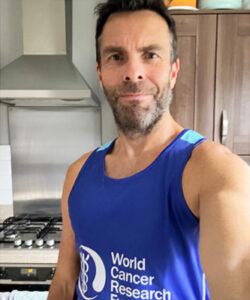 John Steventon is our very own supporter superhero. He completed a HYROX in December dressed as comic book character Wolverine, alongside a friend who dressed as Deadpool – and he isn’t stopping there.
John Steventon is our very own supporter superhero. He completed a HYROX in December dressed as comic book character Wolverine, alongside a friend who dressed as Deadpool – and he isn’t stopping there.
HYROX is an indoor fitness race enhanced by workout stations along the route, so competitors run 1km, then do a workout – 8 times! The workouts include rowing, pulling and pushing a sled, and lunges while carrying a sandbag, making it an exhausting but fun challenge.
John said: “Everything I’ve done in life, I’ve wanted to share with others. As a DJ, I taught aspiring musicians and even wrote DJing for Dummies. In my TV career, I mentor new editors. When I was racing in indoor rowing, I launched the RowAlong YouTube channel to help home rowers stay motivated. So, when I started competing in HYROX, I wondered how I could use this platform to make a difference. “
“I knew I’d never be a podium finisher, but after my skin cancer diagnosis, I found a purpose: racing as Wolverine to raise money for World Cancer Research Fund. The response from the HYROX community has been incredible – not just in donations, but in the conversations I’ve had. Nearly everyone I meet has been touched by cancer in some way, whether personally or through friends and family.”
‘I thought I was invincible’
“Even though the doctor said, “Don’t worry”, when I heard the words “That’s skin cancer” the last hope that I was indestructible fizzled away. I’d always thought I was invincible – after all, I like to dress up as Wolverine – but skin cancer reminded me that none of us are.”
John’s diagnosis helped him become more aware of the importance of cancer prevention. “I remember being 7 years old, resisting my Mum’s attempts to put sun cream on me. I often opted for the lowest SPF possible, thinking sunburn was just a fast track to a tan. Coming from Scotland, where sunshine is a rarity, I’ve always craved the sun’s warmth. But now, I never go without factor 30 or 50. If only I had learned that lesson earlier.
“The guidance from the World Cancer Research Fund has been invaluable in helping me understand the importance of proper nutrition and lifestyle choices in cancer prevention and overall health. Exercise alone isn’t enough – we need to fuel ourselves properly and protect ourselves from preventable risks like excessive sun exposure.”
John continues to take on HYROX challenges to raise money for us. He’s completed 3, including one in Frankfurt, and is running The Grid competition again in September, as well as more HYROX events this year. So far, he’s raised nearly £2,000 towards cancer prevention – thank you, John!
The International Agency for Research on Cancer estimates that, by 2050, the world will see 35 million new cancer cases each year, up by 15 million annual cases in 2022. Yet with the right policies to prevent cancer, 14 million of those people could avoid their diagnosis. These policies would need to address a variety of factors, including tobacco, alcohol, overweight and obesity, breastfeeding and unhealthy diet.
Cancer places increasing burden on society
As the cancer burden increases, the strain on our health systems, economies and families becomes harder to meet. Unhealthy weight – just one risk factor – is projected to cost the global economy more than $4 trillion a year by 2035. Our food systems make eating a healthier diet harder. High production and consumption of red and processed meat, and low consumption of wholegrains, vegetables, fruit and beans, plays a role in increased cancer risk and the risk of other diseases such as diabetes. This misalignment also contributes to unhealthy natural environments, as diet-related greenhouse gas emissions are significant contributors to global warming. Most of these are related to production of animal-based foods. This is why prevention is the only sustainable way forward – with resilient populations and food systems working together for public health.
Prevention the sustainable way forward
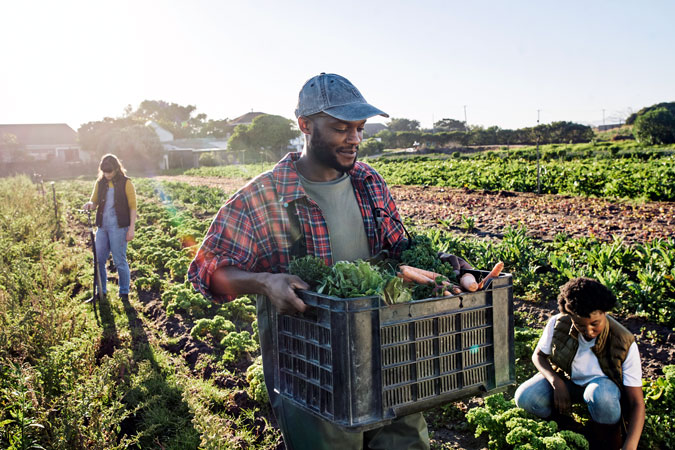 We believe that prevention must be prioritised and is the only sustainable way forward. We also need to better explain:
We believe that prevention must be prioritised and is the only sustainable way forward. We also need to better explain:
- The science around cancer risk and diets, weight, breastfeeding, physical activity, and alcohol – as summarised in our Cancer Prevention Recommendations.
- Which policies should be prioritised to shape healthier environments that minimise these cancer risks for populations.
- How cancer prevention policy can have positive cascading effects for our health, but also for our health systems, our societies and our shared natural environment.
Cancer prevention policies can have ripple effect
We also know that cancer prevention policies can touch on and improve other areas beyond health. For example, diets high in red and processed meat increase people’s risk of colorectal cancer, and that healthier diets made up of more wholegrains, fruit and vegetables can protect people from the same type of cancer. This is why our Cancer Prevention Recommendations say people should limit red and processed meat, and eat a diet rich in wholegrains, vegetables, fruit and beansAt the same time, if our food systems produced less red and processed meat, and animal- food in general, and instead moved towards producing plant-based foods, this would have a significant impact in lowering diet-related CO2 emissions. Policymakers need to make sense of these connections, and our guidance shows what they need to do to promote such positive cycles – or co-benefits.
Why we created the Blueprint
Our well-established Cancer Prevention Recommendations cover 10 ways in which individuals can minimise their risk of preventable cancers. A growing body of evidence is showing that adherence to these Recommendations is associated with lower risk of developing cancer and other NCDs, but also lower risk of dying from cancer.
However, the Recommendations have not – until now – been presented alongside population-level policy advice. We need to promote an integrated approach to preventing cancer, otherwise policymakers may risk formulating repetitive but disconnected policy strategies across these areas that do not speak to or build on each other. For example, marketing restrictions can be a useful tool to encourage healthy diets but are also relevant for promoting breastfeeding and limiting alcohol consumption. Even though the targeted products are different, there are lessons to be learned from policy efforts across different cancer risk factors.
By joining the dots in these different areas, we can create greater awareness of how different policy approaches can contribute to cancer prevention. Our new blueprint makes a compelling case for action, especially for prevention to be included in national cancer plans. The blueprint also reinforces the need for a whole-of-government approach that puts public health goals before commercial interests.
What’s inside the Blueprint?
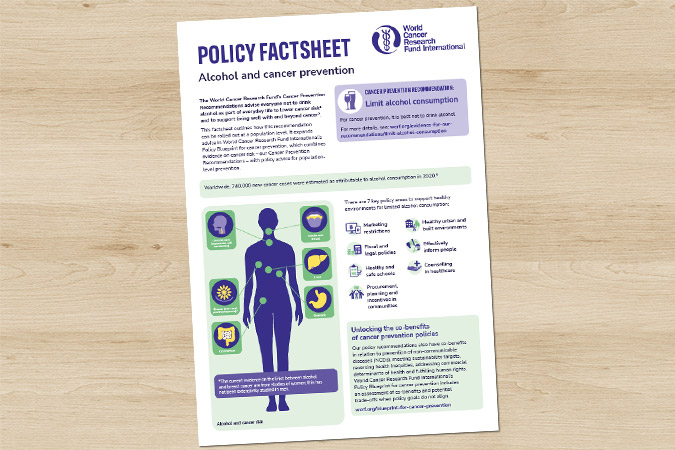
The Blueprint is accompanied by factsheets on specific cancer risk factors.
Our policy blueprint makes the case for population-level policy action and focuses on 5 factors: diet, weight, breastfeeding, physical activity and alcohol – in line with our Cancer Prevention Recommendations. We also look at how these factors can support people living with and beyond cancer
Our blueprint is an essential, evidence-based guide for policymakers and advocates, pulling together tools and resources to provide a comprehensive resource on cancer prevention. It pulls together existing tools and resources to support efforts on cancer prevention, including key guidance for World Health Organization, but also our existing NOURISHING nutrition and MOVING physical activity policy frameworks. All this information is distilled in a package of resources:
- An outline of 8 policy areas – including marketing restrictions, fiscal and legal, procurement, planning and incentives in communities– and how they apply to diet, weight, breastfeeding and physical activity.
- 10 factsheets with in-depth technical detail on how to roll out each Recommendation at population level.
- An exploration of the co-benefits of cancer prevention policy: addressing health inequities; meeting climate and sustainability targets; addressing commercial determinants of health; and fulfilling human rights.
- 7 strategies to help policymakers take action.
The goal of these resources is to strengthen understanding of how environment shapes cancer risk, and what policymakers can do about it.
How it was developed
To develop these resources, we built on our policy work, we reviewed existing key policy documents, and asked experts in the science and policy of cancer prevention, as well as lawyers, advocates for non-communicable disease prevention or breastfeeding what is most important in their respective areas. We then brought all the main elements together.
What’s next?
The Policy blueprint for cancer prevention will now be a centrepiece of our conversations with policymakers going forward – from Member States at the World Health Organization to the UN High-Level Meeting on Non-communicable diseases.
We invite you all to get involved: download the blueprint, share it, and use it in your work.
> Download our factsheets and other policy tools in our resource library
> To give us feedback and share how you want to use the blueprint, write to policy@wcrf.org
Science and football – while they may not seem like they have much in common, the disciplines meet in the person of Dr Frankie Brown. Frankie is an immunologist and former member of Scotland’s women’s team who has represented her country 96 times on the international stage.
Our funding helped Frankie realise her other dream of researching ways exercise can benefit those living with and beyond cancer.
Helping people with blood cancer
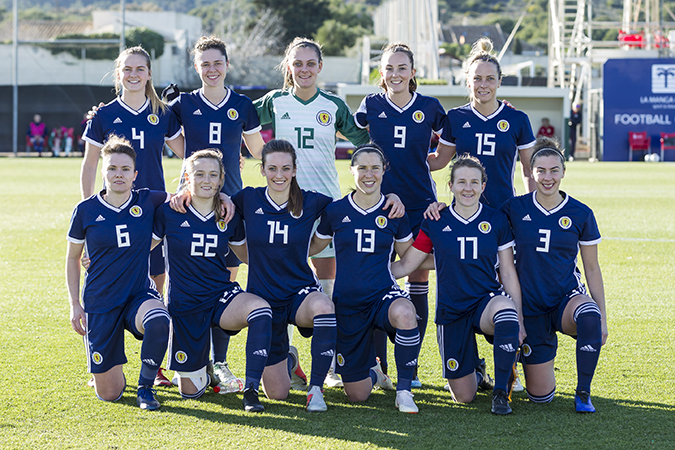
Frankie Brown with her Scotland team-mates
Under Dr Campbell from the University of Bath, Frankie worked in a team on a project funded by us investigating the effects of exercise on the health of patients with chronic lymphocytic leukaemia, a form of blood cancer that affects around 4,000 new people every year in the UK.
The team evaluated the safety and feasibility of a progressive exercise programme for these patients – many who were over 60. Essentially, they tested a “recipe for how to run a big study” more effectively, and even adapted it to continue successfully during the COVID pandemic.
She was inspired by her own background as a professional footballer, as well as her personal experience with cancer:
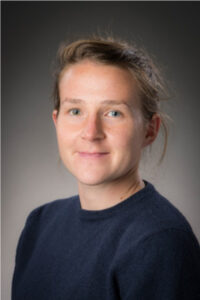 “When I was finishing up my PhD, my mum died of breast cancer. That was a real trigger moment for me to look more into oncology. I just couldn’t get my head around it – she had been so healthy. I would wonder, what’s going on here?
“When I was finishing up my PhD, my mum died of breast cancer. That was a real trigger moment for me to look more into oncology. I just couldn’t get my head around it – she had been so healthy. I would wonder, what’s going on here?
“I already knew a lot about health and monitoring my body for football. I started playing football very young, playing with my little brother, and I haven’t stopped since. I was in the Scotland under 17s, then the under 19s, and got into the full squad when I was 21 and was there for 10 years.
“Having spent my whole life in a high-performance environment, with everything being tested and monitored, I became more aware of how my body reacts to even very small shifts in circumstances and situations. It wasn’t hard for me to see how those tiny changes that are so important to athletes can be important for everybody.”
This inspired Frankie to become a researcher, where she found herself on the team led by Dr Campbell and funded by us. There were, however, some setbacks along the way – the biggest being the COVID-19 pandemic. Thanks to the flexibility of our funding programme, Frankie says she and the rest of the team were able to pivot from designing the programme to be in-person, to buying the participants exercise bikes and running a group session over Zoom.
“We had to shift the whole design of the exercise sessions to be home-based and World Cancer Research Fund allowed us to deliver exercise bikes to the participants’ homes. Without that, the trial would have fallen apart.“
‘The more muscle mass you have as you get older, the more independent you will be’
The data showed a 2% increase in lean mass in the exercise group compared with a 0.4% decrease in the control group. This is a significant benefit, as Frankie explains: “The data we have now and the study we’ve done shows that any gain a patient can make with their performance can make a huge difference to their own wellbeing.
“An increase in lean mass – in other words, in muscle mass – in these patients is a huge thing, especially in people over 60. The more muscle mass you have as you get older the more independent you will be. One of our participants lived up some stairs, and whenever I think about the study, I think about them and hope that my work has made it easier for them to get the shopping up and down to their home.”
These results have informed the design of a larger study where Frankie and her team will assess the tumour-suppressing effects and mechanisms of exercise in humans.
Frankie is very vocal about the impact of our support on her work: “In my experience, World Cancer Research Fund has been incredibly supportive of me as a young academic. They’ve provided amazing flexibility at a very uncertain time. I wouldn’t have been able to achieve any of this without you.”
What do people who took part in the study say?
I was really unfit when I started the trial and in the battle with the bike I came near to collapse! But the research team were watching and got me sorted me out. So I didn't collapse and in fact went on to add 2kg to my muscle mass.
What do people who took part in the study say?
I’m pleased that I took part in the study as although I already did some exercise it pushed me out of my comfort zone and has left me feeling more positive about the future giving me a way to ‘fight back’.
Governments, researchers and organisations (including World Cancer Research Fund) need to keep track of how the number of cancer cases in the UK changes from year to year. This helps with the planning, development, and undertaking of cancer research and evidence-based policy.
Each of the 4 devolved nations of the UK (England, Northern Ireland, Scotland and Wales) regularly report cancer incidence, as well as mortality, through their Cancer Registries. World Cancer Research Fund then uses these data to produce detailed cancer incidence and mortality tables and publishes this information on our website. At the same time, we analyse the data to see how cancer numbers are changing.
Comparing cases of cancer in the UK from 2019 to 2021
In 2021, the most recent year for which data are available, there were 395,181 cases of cancer in the UK. Of these, 200,870 were in men (up very slightly from 200,386 in 2019) and 194,311 in women (up from 187,434 in 2019).
Cancer cases: 2019 and 2021
| Men | Women | Total | |
|---|---|---|---|
| 2019 | 200,386 | 187,434 | 387,820 |
| 2021 | 200,870 | 194,311 | 395,181 |
In terms of percentage changes, cancer incidence among women increased by 3.7% between 2019 and 2021 but stayed pretty much the same for men (increasing by only 0.2%). This means that while the number of cases only increased significantly among women, there was still an overall increase of approximately 7,400 cases, or 2%.
So, although men still experience more cases of cancer than women, the difference in the number of cases between the sexes fell from approximately 12,900 in 2019 to approximately 6,500 in 2021.
How are cases of the most common cancers changing in men and women?
Breast cancer remained the most common type of cancer among women in the UK, with 59,155 new cases in 2021 – approximately 30% of all cancers. This was followed by lung (23,972) and colorectal cancer (21,945). Our analysis shows that, between 2019 and 2021, cases of all 3 increased in women.
Among men, prostate cancer was the most common cancer in the UK. In 2021, 51,575 cases of prostate cancer were diagnosed – approximately 26% of all new cases of cancer – followed by colorectal (27,969) and lung (24,932). While cases of prostate and lung cancer decreased, colorectal cancer cases increased.
Cases of the top 3 site-specific cancers in the UK in 2019 and 2021
| 2019 | 2021 | |
|---|---|---|
| Women | ||
| Breast | 56,601 | 59,115 |
| Lung | 23,614 | 23,972 |
| Colorectal | 20,759 | 21,945 |
| Men | ||
| Prostate | 55,068 | 51,575 |
| Colorectal | 25,303 | 27,969 |
| Lung | 25,140 | 24,932 |
Why is the overall number of cancer cases increasing in women but not in men?
There could be several reasons for this. One of the most important is that approximately 40% of all cancers could be prevented by changes in modifiable risk factors – things in our behaviour or environment that can be changed and make the development of cancer more or less likely. For 2021, this would equate to approximately 158,000 cases of cancer prevented.
When we talk about modifiable risk factors for cancer, these include not smoking, avoiding the sun, maintaining a healthy body weight, being physically active, and eating a healthy diet.
> More information about what is included in a healthy diet
Simply put, it is likely that any changes in the number of new cancer cases are partially explained by changes in the rates of these behaviours. This will be particularly true for those cancers for which there is strong evidence that behaviour increases risk. One recent example of this is rates of smoking declining among men while still increasing among women. As a result, it is predicted that cases of lung cancer among women will outnumber those among men in the next couple of years.
The links between modifiable behaviours and cancer are supported by a growing body of research demonstrating that following our Cancer Prevention Recommendations can help people reduce their cancer risk.
- New guidance developed with experts including patients and service users
- Our Cancer Prevention Recommendations are beneficial after a cancer diagnosis
- Comprehensive review of evidence and recommendations for future research directions
Two new in-depth scientific reports, launched at the World Cancer Congress in Geneva, bring together a full synthesis of the current evidence on diet, nutrition, physical activity and body weight from World Cancer Research Fund International’s Global Cancer Update Programme (CUP Global) on people living with and beyond breast and colorectal cancers.
For the first time, they present guidance for people living with and beyond breast and colorectal cancers, caregivers and health professionals. The reports also discuss the limitations of the existing research and make recommendations for future research to strengthen the evidence base.
Relevant and accessible
The CUP Global research team at Imperial College London conducted 7 systematic reviews, together assessing many thousands of recent research papers, studies and databases. World Cancer Research Fund convened expert panels, including oncologists and researchers, as well as patients and people with lived experience of cancer, to ensure the guidance is relevant and accessible.
Prof Andrew Renehan, Deputy Chair of the CUP Global Expert Committee on Cancer Survivorship, said:
These reports are the culmination of over 2 years of detailed work by World Cancer Research Fund International and the CUP Global partnership. They are a substantial and significant body of work and represent the best synthesis of our knowledge to date. As well as providing guidance for oncology health professionals and people living with and beyond cancer, they offer a clear direction for researchers seeking to advance the field.
Lynette Hill, Public Representative on the CUP Global panel, said:
Our challenge was to translate the complex findings from so many scientific papers into simple messages for people living with and beyond cancer. This will help health professionals to answer questions and inform their patients about the role of diet, physical activity and body weight, and the importance of these to their future health.
The reports show how nutrition, physical activity and body weight affect survival and recurrence. For people living with and beyond breast cancer, there is strong evidence that a physically active lifestyle improves health-related quality of life and that a diet high in fibre may improve health outcomes. For colorectal cancer, the evidence suggests that physically active lifestyles and a diet rich in wholegrain foods, and avoiding sugary drinks, may improve health outcomes and overall survival.
Key evidence in the reports was recently published in a series of linked papers in the International Journal of Cancer, published by the Union for International Cancer Control (UICC),
Dr Sonali Johnson, Head of Knowledge, Advocacy and Policy at the UICC said:
The guidance provided in these reports is about giving people living with cancer the tools they need to take control of their health. By focusing on practical changes such improving diet, staying active and managing weight, we can help reduce the risk of cancer coming back and improve the quality of life for so many, bringing us closer to a world where fewer lives are lost to cancer, and more people can live healthier, longer lives after diagnosis.
World Cancer Research Fund’s CUP Global is the world’s largest source of scientific research on cancer prevention and survivorship through diet, nutrition, physical activity and body weight. It is funded in partnership with American Institute for Cancer Research, World Cancer Research Fund in the UK and Wereld Kanker Onderzoek Fonds in the Netherlands.
Dr Helen Croker, World Cancer Research Fund International’s Assistant Director of Research and Policy, and Head of the CUP Global Secretariat, said:
As an evidence-based organisation, we have used the best available evidence to develop this process and produce practical guidance on diet, physical activity and body weight for people living with and beyond cancer. We hope this guidance will help support people to live longer, healthier lives.
By highlighting gaps in the evidence base, the reports show where further, high-quality research is needed. These include well-designed clinical trials and prospective cohort studies, as well as understanding the biological mechanisms involved. We hope this will be a springboard for further progress.
Download the reports
> Breast cancer
> Colorectal cancer
Download the executive summaries
> Breast cancer
> Colorectal cancer
Summary guidance in the reports
- Suggests that people living with and beyond breast and colorectal cancers consider increasing their physical activity, under the supervision of health care professionals.
- Suggests that people living with and beyond breast and colorectal cancers consider following as many of WCRF/AICR’s Cancer Prevention Recommendations as they are able.
- People diagnosed with breast cancer should consider:
- increasing their dietary fibre intake.
- avoiding gaining weight during and after treatment (if not underweight).
- People diagnosed with colorectal cancer should consider increasing their dietary intake of wholegrain foods, and reducing their sugary drink intake.
Much of the research in these reports build on the 2014 (updated 2018) report: Diet, nutrition, physical activity and breast cancer survivors, which was published as part of the WCRF/AICR Third Expert Report on the links between lifestyle/modifiable behaviours and cancer. At that time, research on cancer survival was limited, but there was enough evidence to conclude that people living with and beyond cancer should follow our Cancer Prevention Recommendations if they can.
Our helpline is run by a team of oncology specialist dietitians. The service aims to help people get the nutritional advice needed to support their cancer treatment and recovery, and will address issues such as taste changes, appetite loss, nausea and constipation as well as how to maintain a healthy weight during treatment.
It can be hard to get access to the appropriate support around nutrition. If you or your patient or client have ever had a cancer diagnosis, and are looking for evidence-based nutrition, the service is available on Tuesdays (12-2pm) and Thursdays (6-8pm). These hours of operation will be expanded as the year progresses.
Comments on the launch of the new helpline
Christopher Allen, Cancer Support Programme Manager at World Cancer Research Fund comments:
We wanted to provide people with cancer a helpline where they can access expert nutritional information. This can often be difficult through the NHS. Treatments such as chemotherapy can make it more of a challenge to eat as you normally would while absorbing the necessary nutrients – and we’ll offer tips and support to make mealtimes easier and more enjoyable for those with a cancer diagnosis.
Jodie Burdett, who had a breast cancer diagnosis, says:
When I was diagnosed, I looked at which habits I could change. It was difficult to know who to trust as there’s quite a lot of ‘advice’ out there with conflicting and confusing messages. So many of us going through chemotherapy unhelpfully get told, ‘you just need to keep your weight up, eat four cream cakes.
That’s when I came across World Cancer Research Fund; its helpline will play a vital role for so many people going through cancer like me who need information about nutrition.
Debbie Hack, Oncology Specialist Dietitian, who takes calls on the helpline, says:
When I heard about World Cancer Research Fund’s new nutrition helpline my immediate thoughts were ‘at last, something that fills the gap.
Dietetic services for cancer vary significantly across the UK and those affected don’t always have access to credible nutritional support. Our helpline addresses this fundamental need. Some people just require reassurance or guidance on how to access the right information, and now we are here to help with that.

A bowel cancer diagnosis during lockdown shocked our supporter Claire Burlison to the core. But following surgery, she’s now living beyond cancer and trying to follow our Recommendations.
A cancer diagnosis can be devastating for anyone. But when you’re young, energetic – and the world is in the grip of a global pandemic – it’s even harder.
“I was diagnosed with bowel cancer in 2020,” says Claire, “which came as a shock as I’m only in my 40s. Before that, I assumed my irritable bowel syndrome was just getting worse. It was only when I got sharp stomach pains and ended up in A&E that I found out I needed surgery.
“I was expecting bad news, but it still knocked me for six when they phoned and told me I had bowel cancer,” she adds.
Although bowel cancer – like most cancers – is more prevalent in older adults, it’s sadly increasingly common in younger people. Researchers are trying to find out why. Fortunately for Claire, doctors found that the cancer hadn’t spread. Now, having been cancer-free for over 2 years, she’s trying to follow our Recommendations in her daily life to reduce the risk of cancer returning.
Conscious eating
Claire limits alcohol and is much more aware of what she eats – checking food labels to see what’s really in the food she’s buying, and dramatically reducing how much red and processed meat she eats, because of the strong links to bowel cancer.
Exercise is also important for people living beyond cancer – with both physical and mental benefits. For Claire, staying active comes naturally as she is the founder of the international dance phenomenon Clubbercise. Blending simple but effective dance, toning and combat moves, Clubbercise is a workout with a difference aimed at all abilities. The atmosphere is more nightclub than gym, as people dance together in a darkened room with low lighting and flashing LED glow sticks.
Know the symptoms of bowel cancer
Claire says she’s “proud to still be here supporting Bowel Cancer Awareness Month”, which takes place in April every year.
“Thankfully, my cancer was caught early and I’m fine now but many people aren’t so lucky. I’ve lost friends to this terrible disease and I’m keen to raise awareness to help others. If you notice any changes to your bowel habits that last more than a couple of weeks please see your doctor straight away – it could save your life!”
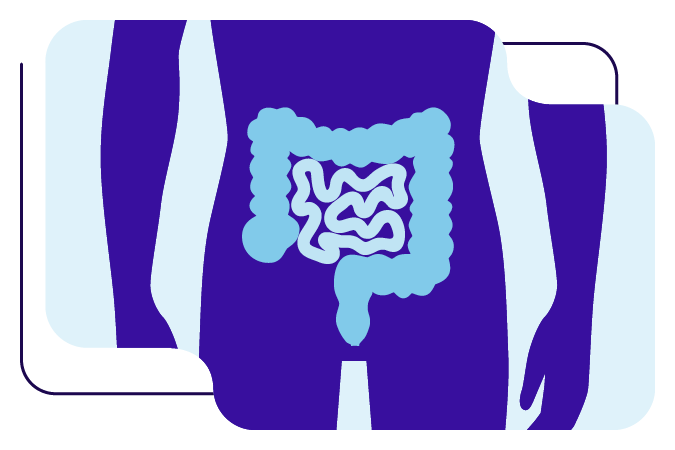
Get the lowdown on bowel cancer
What does our research say about how you can prevent the disease?

